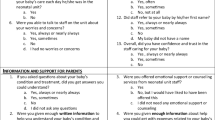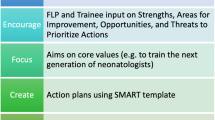Abstract
Objective
To determine whether the use of family members as educators in a structured educational intervention would increase neonatology fellows’ confidence in performing core communication skills targeted to guide family decision-making.
Study Design
Neonatology fellows at two centers participated in simulation-based training utilizing formally trained family members of former patients. Fellows completed self-assessment surveys before participating, immediately following participation, and 1-month following the training. Family members also evaluated fellow communication.
Results
For each core competency assessed, there was a statistically significant increase in self-perceived preparedness from pre-course to post-course assessments. Fellows additionally endorsed using skills learned in the curriculum in daily clinical practice. Family educators rated fellow communication highest in empathetic listening and nonverbal communication.
Conclusions
Participation in a communication skills curriculum utilizing formally trained family members as educators for medical trainees successfully increased fellows’ self-perceived preparedness in selected core competencies in communication. Family educators provided useful, generalizable feedback.
This is a preview of subscription content, access via your institution
Access options
Subscribe to this journal
Receive 12 print issues and online access
$259.00 per year
only $21.58 per issue
Buy this article
- Purchase on Springer Link
- Instant access to full article PDF
Prices may be subject to local taxes which are calculated during checkout
Similar content being viewed by others
References
Brinchmann BS, Forde R, Norvedt P. What matters to the parents? A qualitative study of parents’ experiences with life-and-death decisions concerning their premature infants. Nurs Ethics. 2002;9:388–404.
Madrigal VN, Carroll KW, Hexam KR, Faeber JA, Morrison WE, Feudtner C. Parental decision-making preferences in the pediatric intensive care unit. Crit Care Med. 2012;40:2876–82.
Patridge JC, Martinez AM, Nishida H, Boo NY, Tan KW, Yeung CY, et al. International comparison of care for very low birth weight infants: parents’ perceptions of counseling and decision-making. Pediatrics. 2005;116:263–71.
Meert KL, Thurston CS, Sarnaik AP. End-of-life decision-making and satisfaction with care: parental perspectives. Pedia Crit Care Med. 2000;1:179–85.
Shellabarger SG, Thompson TL. The critical times: meeting parental communication needs throughout the NICU experience. Neonatal Netw. 1993;12:39–45.
Jacobowski NL, Girard TD, Mulder JA, Ely EW. Communication in critical care: family rounds in the intensive care unit. Am J Crit Care. 2010;19:421–30.
Wyatt KD, List B, Brinkman WB, Prutsky Lopez G, Asi N, Erwin P, et al. Shared decision making in pediatrics: a systematic review and meta-analysis. Acad Pedia. 2015;15:573–83.
Boss RD, Hutton N, Donohue PK, Arnold RM. Neonatologist training to guide family decision-making for critically Ill infants. Arch Pedia Adolesc Med. 2009;163:783–8.
Accreditation Council for Graduate Medical Education. ACGME Program requirements for Fellowship Education in Neonatal-Perinatal medicine. 2007; http://www.acgme.org/acWebsite/downloads/RRC_progReq/320_pediatrics_subs_01012007.pdf.
Arnold RM, Back AL, Barnato AE, Prendergast TJ, Emlet LL, Karpov I, et al. The critical care communication project: improving fellows’ communication skills. J Crit Care. 2015;30:250–4.
Yuen JK, Mehta SS, Roberts JE, Cooke JT, Reid MC. A brief educational intervention to teach residents shared decision making in the intensive care unit. J Palliat Med. 2013;16:531–6.
Koropchak CM, Pollak KI, Arnold RM, Alexander SC, Skinner CS, Olsen MK, et al. Studying communication in oncologist-patient encounters: the SCOPE trial. Palliat Med. 2006;20:813–813.
Yedida MJ, Gillespie CC, Kachur E, Schwartz MD, Ockene J, Chepaitis AE, et al. Effect of communications training on medical student performance. J Am Med Assoc. 2003;290:1157–65.
Bagatell R, Meyer R, Herron S, Berger A, Villar R. When children die: a seminar series for pediatric residents. Pediatrics. 2002;110:348–53.
Arnold R, Nelson J, Prendergast T, Emlet L, Weinstein E, Barnato A, et al. Educational modules for the critical care communication (C3) course – a communication skills training program for intensive care fellows. 2010; https://www.uclahealth.org/palliative-care/Workfiles/Educational-Modules-Critical-Care-Communication.pdf.
Back AL, Arnold RM, Tulsky JA, Baile WF, Fryer-Edwards KA. Teaching communication skills to medical oncology fellows. J Clin Oncol. 2003;21:2433–6.
Ranjan P, Kumari A, Chakrawarty A. How can doctors improve their communication skills? J Clin Diagn Res. 2015;9:JE01–JE04.
Weiss S, Goldlust E, Vaucher YE. Improving parent satisfaction: an intervention to increase neonatal parent-provider communication. J Perinatol. 2010;30:425–30.
Wysham NG, Mularski RA, Schmidt DM, Nord SC, Louis DL, Shuster E, et al. Long-term persistence of quality improvements for an intensive care unit communication initiative using the VALUE strategy. J Crit Care. 2014;29:450–4.
Boss RD, Urban A, Barnett MD, Arnold RM. Neonatal critical care communication (NC3): training NICU physicians and nurse practitioners. J Perinatol. 2013;33:642–6.
Newcomb AB, Trickey AW, Porrey M, Wright J, Piscitani F, Graling P, et al. Talk the talk: implementing a communication curriculum for surgical residents. J Surg Educ. 2017;74:319–28.
Towle A, Brown H, Hofley C, Kerston RP, Lyons H, Walsh C. The expert patient as teacher: an interprofessional Health Mentors programme. Clin Teach. 2014;11:301–6.
Fiddes PJ, Brooks PM, Komesaroff P. The patient is the teacher: ambulatory patient-centered student-based interprofessional education where the patient is the teacher who improves patient care outcomes. Intern Med J. 2013;43:747–50.
Adams G, Green A, Towe S, Huett A. Bereaved caregivers as educators in pediatric palliative care: their experiences and impact. J Palliat Med. 2013;16:609–15.
Hynson JL, Aroni R, Bauld C, Sawyer SM. Research with bereaved parents: a question of how not why. Palliat Med. 2006;20:805–11.
Acknowledgements
Thank you to DeeJo Miller for her assistance in the creation and implementation of this project and to the participating neonatal–perinatal medicine fellows at both performance sites. The authors also wish to thank the Patient and Family Partnership Council at University Hospitals Cleveland Medical Center Rainbow Babies and Children’s Hospital and the Family Advisory Board at Children’s Mercy Hospital for their many contributions.
Funding
All phases of this study performed at Rainbow Babies and Children’s Hospital were supported by internal grant funding through the Rainbow Babies and Children’s Foundation Fellowship Research Award Program. Study related activities performed at Children’s Mercy Hospital were supported by organizational funding provided by Children’s Mercy Hospital.
Author information
Authors and Affiliations
Contributions
Dr. Parham conceptualized and designed the study, created key study-related materials, reviewed and adapted key study-related materials, recruited and trained key study personnel, designed and revised data collection instruments, implemented and provided oversight for all phases of the study at both performance sites, collected the data, drafted the initial paper, and reviewed and revised the paper. Drs. Reed, Sharma, and Brunkhorst provided key study-related material utilized in the recruitment and training of study personnel, were responsible for the implementation and oversight of all phases of the study at Children’s Mercy Hospital, coordinated and supervised data collection at Children’s Mercy Hospital, and critically reviewed the paper. Dr. Olicker assisted in the conceptualization and design of the study, revision and adaptation of key study-related materials, revision of data collection instruments, and the review and revision of the paper. Dr. Parrill assisted in the conceptualization and design of the study, revision of data collection instruments, and revision of the paper. Dr. Noel-MacDonnell assisted in the data collection and all phases of data analysis as well as the critical review and revision of the paper. Dr. Voos assisted in the conceptualization and design of the study, revision and adaptation of key study-related materials, recruitment of key study personnel, revision of data collection instruments, provided oversight for all phases of study at both performance sites, supervised data collection, and critically reviewed the paper. All authors approved the final paper as submitted and agree to be accountable for all aspects of the work.
Corresponding author
Ethics declarations
Conflict of interest
The authors declare that they have no conflict of interest.
Additional information
Publisher’s note: Springer Nature remains neutral with regard to jurisdictional claims in published maps and institutional affiliations.
Rights and permissions
About this article
Cite this article
Parham, D., Reed, D., Olicker, A. et al. Families as educators: a family-centered approach to teaching communication skills to neonatology fellows. J Perinatol 39, 1392–1398 (2019). https://doi.org/10.1038/s41372-019-0441-7
Received:
Revised:
Accepted:
Published:
Issue Date:
DOI: https://doi.org/10.1038/s41372-019-0441-7
This article is cited by
-
Essentials of neonatal-perinatal medicine fellowship: innovations in medical education
Journal of Perinatology (2022)



